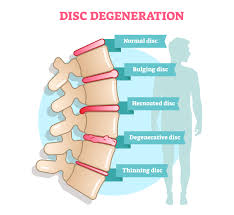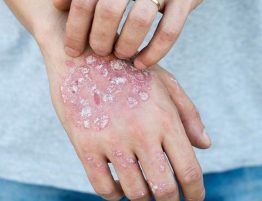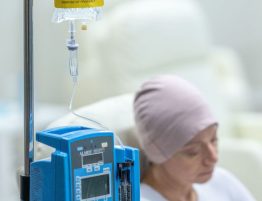
Degenerative disc disease (DDD) is an age-related condition that happens when one or more of the discs between the vertebrae of the spinal column deteriorates or breaks down, leading to pain.
The discs in a person’s back are located in between the vertebrae of the spine. They act as cushions and shock absorbers. Discs help a person to stand up straight. And they also help in moving through everyday motions, such as twisting around and bending over.
Over time, DDD can worsen. There may be weakness, numbness, and pain that radiates down the leg.
Symptoms
The patient will probably feel a sharp or constant pain in their back and neck. The exact symptoms depend on where the weak disc is and other changes it has caused.
Common signs include pain that;
- Is in the lower back, buttocks, or upper thighs
- Comes and goes. It can be nagging or severe, and can last from a few days to a few months
- Feels worse when the patient sits, and better when they move and walk
- Feels worse when they ben, lift or twist
- Gets better when the patient change position or lie down
People with DDD might experience less pain after walking and exercise. DDD can also cause weakened leg muscles, as well as numbness in the arms or legs.
Causes
DDD is primarily caused by wear and tear of spinal discs. Over time, discs naturally tend to dry out and lose their support and function. This can lead to pain and other symptoms of DDD. DDD can start developing when a person is in their 30s or 40s, and then progressively worsen.
This condition can also be caused by injury and overuse, which may result from sports or repetitive activities. Once a disc is damaged, it can’t repair itself.
Treatment
DDD treatments may include one or more of the following options;
Heat or Cold Therapy – cold packs can help decrease pain associated with a damaged disc, while heat packs can reduce the inflammation that causes pain.
Over-the-counter Medications – Acetaminophen can help alleviate pain from DDD. Ibuprofen can minimize pain while also decreasing inflammation. Both medications can cause side effects when taken with other medications, doctors advice is necessary to know which one is appropriate for a patient.
Prescriptions Pain Relievers – when over-the-counter pain relievers don’t work, the patient may consider prescription versions. These options should be used with care as they carry the risk of dependency and should be used only in cases where pain is severe.
Physical Therapy – the therapist will guide the patient through routines that help to strengthen the back muscles while also alleviating pain. Over time, they will likely notice improvements in pain, posture, and overall mobility.
Surgery – depending on the severity of the condition, the doctor may recommend either an artificial disc replacement or a spinal fusion. The patient may need surgery if the pain doesn’t resolve or it gets worse after six months.
- Artificial disc replacement – involves replacing the broken disc with a new one made from plastic and metal.
- Spinal fusion – connects affected vertebrae together as a means of strengthening.
What We Offer
We at Almurshidi Medical Tourism will find the best doctors to cater to your needs. We are partnered with a wide network of hospitals and clinics that provide top quality medical experience.
We provide free medical estimates, make medical appointments, and provide several medical opinions if needed at no cost.
Contact Us
For more information contact us at +66822004040 or via WhatsApp







